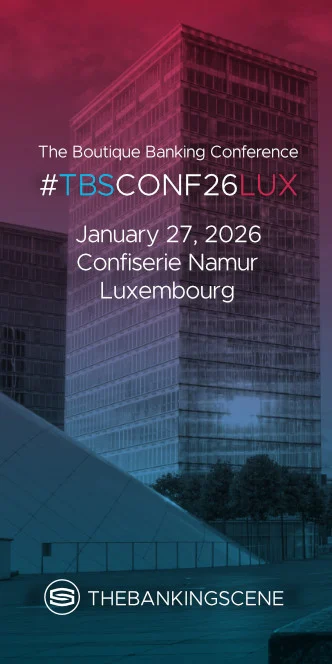
Insights & Opinions
The Problem with Digital Transformation... is YOU
Tue, 02 May 2023


“There are days that I miss working in a bank, how relaxing it must be to have absolutely no sense of urgency. And then I remember that as a banker, it drove me absolute bonkers. Because I felt the sense of urgency, even if the organisation around me didn’t.“
Many of us read about #Ledawrites, Leda Glyptis’ weekly blog, “exploring all kinds of topics, from the technicalities of core banking systems and the payments landscape to what it’s like working for a toxic boss, “Wyld Stallyns” leading banks’ innovation efforts and survival tips for start-ups doing business with big banks.”
Leda sees herself as “a recovering banker, lapsed academic and long-term resident for the banking ecosystem”. Officially, she is the Chief Client Officer at 10X Banking, and the author of the book “Bankers Like Us: Dispatches from an Industry in Transition”.
Also, she is the headliner at The Banking Scene Conference 2023 Brussels, which she happily joins with 450 copies of that book: one for each participant.
We invited Leda on April 27 for a chat about her book, her vision for transformation in banking and the need for new leadership in the industry.
Humans Getting in Their Own Way
Leda has worked in several banks. She knows the dynamics of a bank in, and also out, as she has worked at the other side of the table for a few years now. She witnessed that, although the complexities of digital transformation challenges may have increased over the years, in fact, the fundamentals of what makes it difficult have not changed a lot.
These fundamentals are timeless, which Leda explains in her book with deeply personal stories, her stories from the wonderful world of finance.
Although the stories are all testimonials from the banking and finance industry, most of the learnings and lessons apply to any industry.
These fundamentals are timeless and universal.
So is the resistance against digital transformation, and the transformation of doing digital transformation right.
Leda’s publisher also saw this and raised the question of broadening the scope a bit. But… the book title remained “Bankers Like US – Dispatches from an Industry in Transition.”
“The reason I’ve doubled down on banking is because I find that the objections are fought out in such minor detail that, unless you’re seasoned and extremely knowledgeable about why that particular example doesn’t disqualify the general argument, it would be very easy for people to go, that doesn’t apply to me”, explained Leda.
“Because I fundamentally believe that the mechanics of what I described particularly, a lot of it is about humans getting in their own way, which applies to everything.”
So the challenge of doing digital is about humans getting in their own way. Why is that?
The first reason, according to Leda, is not knowing where transformation ends: “It’s an ever-shifting landscape. And you can’t plan when you don’t know all the factors. And you can’t plan when you don’t know when it stops. So it’s fair to say that people are finding it hard, because it is hard.”
Second: Change is disruptive: “Change is frustrating on a human level; it creates insecurity and anxiety. We have an industry that has been thoroughly stable for a few decades. People went in and started building careers in a certain way. And now you’re going, none of what you’ve learned is useful for the next step. This causes personal anxiety.”
Last but not least: bankers are equipped with the wrong tools to start the journey: “An organisation that is 100 years old is going on this journey with all the wrong things in the kitbag: hierarchies, behaviours, habits, ways of rewarding people, the systems, you don’t have the right kit for the journey. So, you’re trying to go on a journey that is personally disruptive, stressful and unclear how far it’s going with all the wrong equipment. It’s hard.”
Diversity is Worth Every Penny
A bit chunk of Leda’s #bankingpoetry, both in the book and her blogs, discuss the richness of diversity for an organisation and what it takes to build a diverse organisation.
Leda’s main argument for diversity is the one of preservation, unlike my personal favourite argument for a diverse organisation (be a mirror of society to build products and services that matter to society).
“Because transformation is so hard”, she said, “banks need talent, a lot of it.” So, instead of limiting your talent scouting to the 20% middle-class white males, it is much smarter to look at 100% of the population for that talent.
Change again… a challenge again… but why? Why does it take so long for an industry to be representative of the audience they serve?
Leda: “There is a little bit of demographic bias in that we tend to perpetuate, we tend to conflate the familiar with the appropriate, we tend to have shared language with people who are like us, either culturally, or from a client’s perspective and an education perspective.”
She continued: “When we talk about diversity and inclusion, we need to stop treating them as victimless crimes. In a society or a company that is non-inclusive, somebody suffers. So, we need to start having much more jarring language when we try to solve for these things. Because the implication of someone suffering is that someone is causing that suffering, intentionally or unintentionally.”
Aside from ethical reasoning, many other arguments exist for investing in diversity. Leda referred to John Coates, author of the book “Hour Between Dog And Wolf”. He explained that people’s decisions on money aren’t purely rational, and depend heavily on someone’s contextual situation. Women are biologically better equipped to deal with stress and adrenaline, giving them a head start in decision-making.
Diversity starts with the hiring, but it doesn’t stop there, was another key message from Leda: “It needs to be fixed further into the organisations. We need to hire, which means that as a hiring manager, you need to push back on any pipeline of talent that is not diverse, across every vertical. I don’t care if you end up hiring a white male; I have hired many of those in my time. And they’re some of the best people I’ve ever worked with. That’s not the issue. Push back on the pipeline, even if that means that the position will stay open longer.”
Diversity doesn’t stop with hiring. Perhaps more important is retention. Leda: “When women say that the environment they work in is inhospitable, when people say that there are microaggressions that make the environment racist. ‘I don’t see that’ is the common answer we get. This is an unacceptable answer. So, once you’ve hired them, retain them by listening to what makes your environment insufficiently inclusive.”
That is where real change happens, on an organisational level. And that matters because that is where you reap the benefits of an inclusive and diverse company. It is hard work, but it matters, explained Leda.
Conclusion
We spoke about much more, as usual, under Chatham House Rules. The main conclusion is that making a positive change is hard work and requires a lot of attention. It is hard and precious work because you deal with people.
On the bright side, making that journey a success will make your organisation more robust, resilient and future-proof than ever before.
As we said: Leda will be speaking at The Banking Scene Conference 2023 Brussels on May 16. She will also be moderating a panel on people management and diversity.
Every attendee goes home with a hard copy of her book “Bankers Like Us: Dispatches from an Industry in Transition”.



